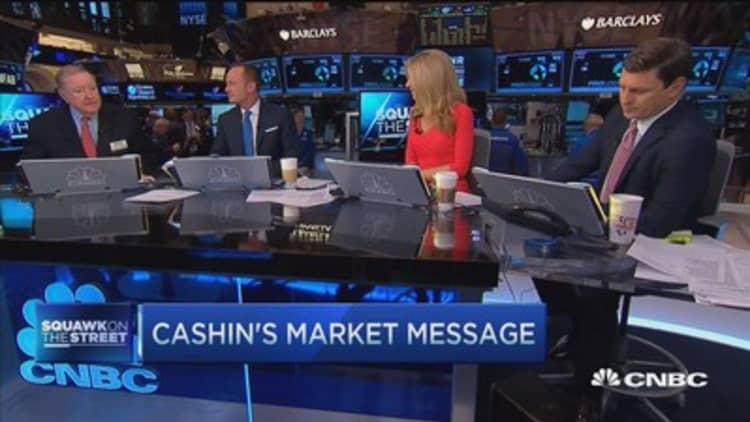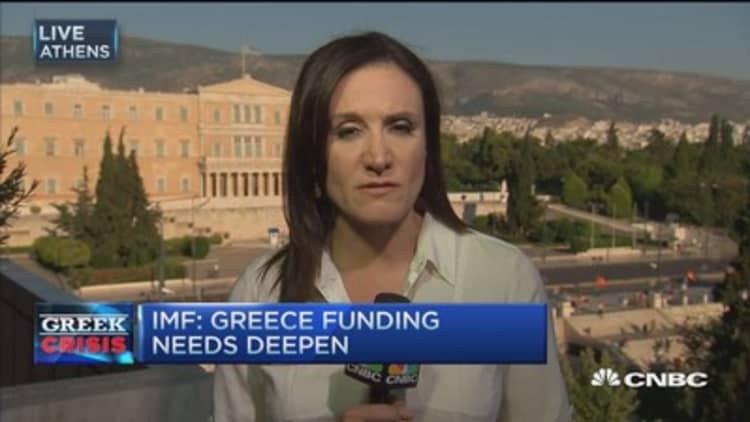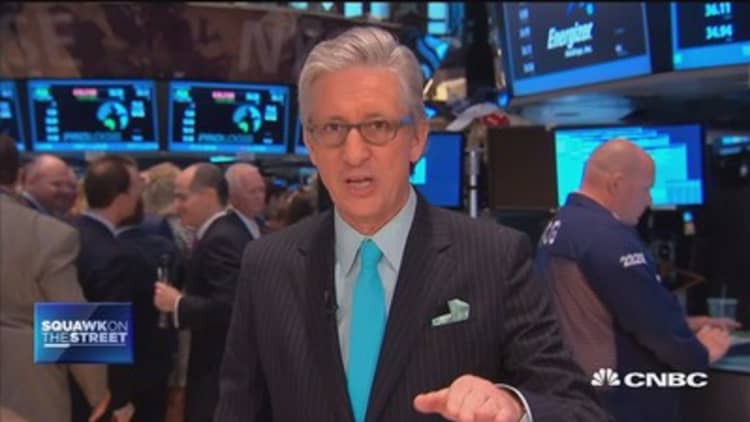


U.S. stocks closed little changed on Thursday, the last day of trade for the week, as investors eyed a soft jobs report and were on edge ahead of Greece's Sunday referendum. (Tweet This)
The Nasdaq and S&P 500 ended just below the flatline after attempting slight gains in the close, with utilities advancing and biotechs reversing an earlier loss. Trade volume was light ahead of the Independence Day holiday on Friday.
"I think Greece is weighing on markets—the uncertainty and the lack of resolution. It's taken longer than most people were expecting," said Stephen Freedman, senior investment strategist at UBS Wealth Management Americas. Still, "it's good to know the fundamentals of the U.S. economy are solid given the geopolitical risks elsewhere."
Greek Prime Minister Alexis Tsipras said in a Dow Jones report the leaders will have a deal 48 hours after the referendum. He added that if "no" wins, he will be in Brussels the next day and sign a deal.
The International Monetary Fund warned on Thursday in the preliminary draft of its latest debt sustainability report that Greece would need an extension of its European Union loans and a large debt writeoff if it grows more slowly than expected and economic reforms are not implemented, Reuters said. The document added that Athens needs about 51.9 billion euros between October 2015 and December 2018.
The Greek stock exchange and local banks remained closed for a fourth day in a row on Thursday. Talks between Greece and its international lenders are now postponed until after Sunday's referendum on the country's bailout terms.
European Central Bank leaders plan to discuss emergency funding for Greek banks on Monday, a source familiar with the situation told Reuters.
The debt crisis has fueled concerns that the country could become the first to leave the 19-member euro zone— an uncertainty that has kept global markets on edge.
Read MoreGreek latest: PM Tsipras warns of 'no' vote consequences
"At the end of the day you may see more pressure on stocks because we have this Greece referendum on Sunday and a three-day weekend," said JJ Kinahan, chief strategist at TD Ameritrade. The problem with "the whole Greece situation, even if we know how the vote comes out, is we don't know what to make of the whole situation."
Stocks gave up opening gains to trade mildly lower. Initial declines in biotechs and Apple weighed on the Nasdaq to underperform for much of the day. Utilities jumped more than 1 percent to lead gains in the S&P 500 as Treasury yields fell.
The Dow transports edged higher as JetBlue jumped 2.8 percent. Southwest, United and Delta failed to recover from a selloff in airlines on Wednesday following news of a .
Read MoreThe jobs report is missing something big
The jobs report is "bit of a disappointment. I thought we'd get a higher number based on ADP yesterday. And the other thing is wage growth is flat," Kinahan said. Another discouraging factor he noted was the downward revision to the previous months' reports.
Those negative points don't rule out a September rate hike, but could reduce the number of increases this year to one from the previously signaled two, he said.
Futures pared gains after initially rising modestly on U.S. nonfarm payrolls that showed creation of 223,000 jobs and an unemployment rate of 5.3 percent, both slightly lower than expectations. However, that decline in unemployment was due to a sharp fall in labor force participation to its lowest level since October 1977.
"I think the real issue is the number of people who have left the workforce or have given up," said Chris Abts, president and founder of Cornerstone Retirement Group.
"Obviously the economy continues to move slowly in all directions but this is not enough to change anything," he said.
Hourly wages for June were unchanged. May's figures were revised lower, down to 254,000 jobs from 280,000 and wage growth of 0.2 percent.
Bond yields fell, with the 10-year yield near 2.38 percent and the trading around 0.64 percent. The U.S. dollar weakened, with the euro briefly topping $1.11.
5-day performance of US 10-year yield
"I think it in totality was a moderate report that the market seems to like. I think, not too hot, not too cold," said Tom Wright, director of equities at JMP Securities.
The June jobs data was released a day early this month due to observance of the Independence Day holiday on July 3.
In other economic news, weekly jobless claims came in at 281,000, while factory orders for May showed a 1 percent decline.
Kim Forrest, senior equity analyst at Fort Pitt Capital, said the soft data weighed on stocks.
"We were much higher and reconsidered that," she said.
Overseas, Puerto Rico paid all $1.9 billion of its debt due Wednesday, keeping the island afloat after its governor warned on Monday the commonwealth would have difficulty repaying the approximately $72 billion it owes.
Read MoreEarly movers: HNT, TSLA, POT, AN, FDO, GE & more
European stocks closed lower as investors eyed Sunday's referendum. Chinese stocks continued to slide, with the Shanghai Composite closing 3.5 percent lower despite a relaxation in rules on using borrowed money to invest.
U.S. stocks closed higher on Wednesday, lifted by better-than-expected data and hopes of a resolution between Greece and its creditors. Athens missed a Tuesday repayment deadline, becoming the first developed economy to default on a loan to the International Monetary Fund.
"I think most market participants are really just on hold right now to see who blinks first," said Kevin Mahn, chief investment officer at Hennion and Walsh Asset Management.
In stock news, shares of Yelp closed 10 percent lower after being halted amid reports that its sale process was stopped.
Vertex Pharmaceuticals jumped 4 percent after being halted amid news that the Federal Drug Administration approved the firm's new drug.
Tesla closed up 3.4 percent after reporting more than 50 percent increase in auto sales from the same period last year.
Major U.S. Indexes
The major averages had their worst trading day of the year on Monday and failed to recover those losses, ending the shortened week lower by about one percent or more. The Dow remained in negative territory for the year after falling into the red on Monday.
The Dow Jones Industrial Average closed down 27.83 points, or 0.16 percent, at 17,730, with Intel leading gains and DuPont the greatest laggard.
The closed down 1.16 points, or 0.06 percent, at 2,076.27, with utilities leading four sectors higher and materials the greatest decliner. Utilities was the only sector to post gains for the week.
The Nasdaq closed down 3.91 points, or 0.08 percent, at 5,009.21.
The CBOE Volatility Index (VIX), widely considered the best gauge of fear in the market, traded higher near 17.
Advancers were a touch ahead of decliners on the New York Stock Exchange, with an exchange volume of 714 million and a composite volume of nearly 3 billion in the close.
High-frequency trading accounted for 49 percent of July 1 trading volume of about about 7 billion shares, according to TABB Group. During the peak levels of high-frequency trading in 2009, about 61 percent of 9.8 billion of average daily shares traded were executed by high-frequency traders.
Crude oil futures for August settled down 3 cents at $56.93 a barrel on the New York Mercantile Exchange. Gold futures ended down $5.80 at $1,163.50 an ounce.
On tap this week:
Friday
Fourth of July holiday
Bond and stock market closed
More From CNBC.com:


